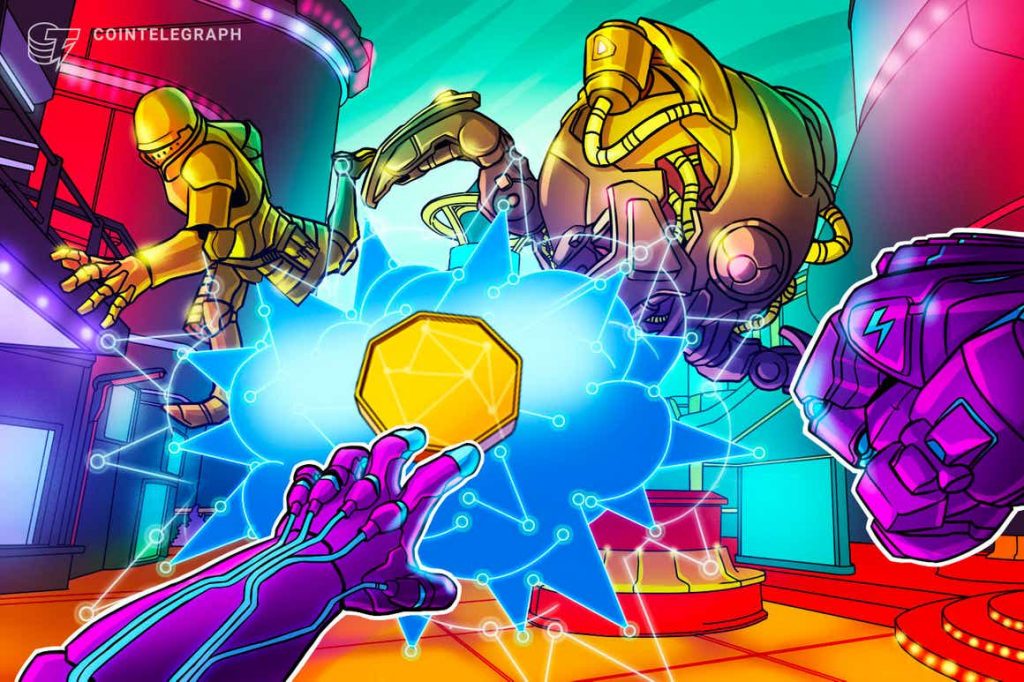Web3 gaming in the third world: Axie facilitating billions

The research department of blockchain analytics platform Nansen have published a comprehensive guide to popular play-to-earn game Axie Infinity, calculating quantitative insights such as that 2.8 million unique addresses are currently holding 11.1 million Axies, alongside that 97% of those users hold a minimum of three Axie nonfungible tokens, or NFT’s.
Axie Infinity is a play-to-earn game constructed around the collection of, and interaction with, digital pet avatars called Axies. Built by Vietnamese gaming studio Sky Mavis in March 2018, the game rose to cultural prominence during 2019 following the emergence of stories in which players from third-world countries such as Venezuela and Philippines were making a full-time living off of Axie’s native crypto assets: Smooth Love Potion (SLP) and Axie Infinity (AXS).
In May 2021, 22-year-old John Aaron Ramos, recognized as Magnus TV within the gaming community, announced that Axie Infinity had empowered him to make two lucrative property purchases in the Philippines.
Nansen’s report follows the trend of other public assessments of Axie, principally focusing on the perks of authenticated ownership of in-game assets, secondary marketplace trading opportunities, decentralized governance, as well as the impending potential for cross-game interoperability, among others.
On the subject of decentralization, Ethereum’s co-founder Vitalik Buterin was infamously inspired to pursue the technology following a distressing experience on World of Warcraft, a game previously owned by Activision Blizzard before their acquisition by Microsoft for $69 billion in January.
Buterin stated that “Blizzard removed the damage component from my beloved Warlock’s Siphon Life spell.” In other words, Blizzard implemented an upgrade which recalibrated the power dynamics of certain characters and weapons, and therefore Buterin became what’s known in the gaming scene as a ‘nerfed’.
The prevalence of such incidents across the wider gaming community has exposed the reliance of centralized servers, and in turn, become a point of which to drive new innovation from.
An infographic from the Nansen report visualizes the proposed impact of integrating NFT’s within gaming ecosystems, signalling a transition from the traditional linear top-down model, to a circular one which promotes a user-governed DAO mechanism to grant players self-sovereignty in their quest for entertainment.
In a recent endeavour to refute criticisms levelled at gaming studios adopting and integrating NFT’s, the co-founder of popular streaming platform Twitch, Justin Kan, argued that gamers should embrace the emergence of blockchain, dispelling fears that gaming uniqueness and environmental impact, among others, are insurmountable obstacles for the industry to overcome, or perhaps more likely, find consensus on.
NFT games are better for players and for game developers.
Like the free-to-play revolution changed gaming, so will blockchain. The games of the future will be fully robust, with open and programmable economies.
— Justin Kan ❄️ (@justinkan) February 9, 2022
Related: The ethics of hiring cheap Filipino staff: Crypto in the Philippines Part 2
Considering data revelations that Axie Infinity has generated $1.3 billion dollar of revenue, and $4 billion in transactional volume over course of the last year — a portion of which equates to company profit — we spoke to a number of experts and enthusiasts from the space to attain a balanced verdict on the genuine potential of blockchain play-to-earn games.
John Chen, the President of decentralized layer-2 protocol Umbrella Network provided contextualization to the thesis that blockchain gaming can be seen to glorify the fortunes of a minority of users, typically located in under-developed nations, as justification for what could potentially be deemed a modern forms of resource exploitation.
Chen noted that “We are in the early stages of blockchain gaming — too early to suggest there is a narrative for blockchain gaming. Additionally, we don’t see it as resource exploitation”, before stating:
“Certainly, those who are participating as gamers in developing nations don’t seem to see it that way, as P2E games are providing a previously unavailable source of income, oftentimes in amounts that are making a significant impact on people’s livelihoods.”
As a resident of Manila in the Philippines, Head of Marketing at Laguna Games, Brian Akaka, revealed that societal incidents such as “COVID, vaccine availability, country development” have made a significant impact on adoption rates of P2E games in South East Asia, before continuing:
“To call them resource exploitation is a First World view. Here it is much more about an opportunity that didn’t exist before, although one with a high barrier of entry. Certainly, US based media are going to cover it from a certain perspective, but it’s important to note that it is a different perspective here.”
Experts and enthusiasts across the space have often touted that attaching financial incentives such as NFT’s and tokens to gaming platforms serves as an innovative business model which could propel them into a new landscape, while others foresee the potential pitfalls with the implementation aspect.
Very few traditional game designers have experience controlling gameplay and gamer psychology when the NFTs and tokens create their own out-of-game economy. The first step is acknowledging this reality and purposefully designing the game with these different forces in mind.
— eva (@wvaeu) November 22, 2021
The decision of Axie Infinity to remodel their reward system came under scrutiny by some over the last few weeks, a move which saw an removal of daily quest and adventure modes, as well as a reduction in the daily supply of Smooth Love Potions (SLP) by approximately 56%. According to the platform, the inference measure was imperative to avoid the risk of “total and permanent economic collapse.”















